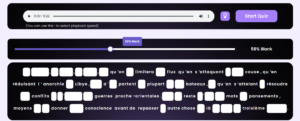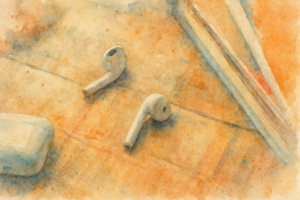
Listening skills are key
“Learning a language is like unlocking a new world”. A cliché and, for sure, something you’ve heard before. There is something to it…
When I dive into a new language, I find there is so much culture wrapped up in the language. Every expression comes from their “normal” culture. And it is culture that is different from my own, as a non-native speaker.
Using my ear to learn French
I believe that listening comprehension is the most important skill you need to master. Listening comprehension combines it all: the vocab, the grammar, and the culture in one beneficial skill.
When I listen to a language in real life, I hear its authentic usage. Improving listening skills lets me pick up the culture, vocab, grammar, pronunciation — all of it.
And my opinion on this certainly does influence this website massively. Many teachers will tell you grammar is the most important part of a language. While I agree grammar is a key skill, it does not make or break basic communication. And to get there, you need to understand what was said.
Listen & embrace the correction
When you listen for corrections, you can improve even more. While in France I often find that native speakers repeat what I said with the correct tense, different vocab, or more natural phrasing back to me. I welcome their corrections as a way to improve.
Every correction I receive from French people in France is golden. They’re my teachers. I love my ear because I can pick up turns of phrase and colloquial expressions that don’t exist in textbooks. These are how the French language lives in the real world. Listening is the key tool that unlocks fluency.
Getting out in the real world and speaking French with French people is the only way to master the language.

Podcasts for improving French listening skills
Podcasts are a step in that direction. Podcasts provide real-life, authentic exposure to the language in a controlled environment.
There, of course, is a time and a place for French teachers, but at some point we need to get more exposure and more varied exposure to the language.
In this post, you’ll discover why podcasts are so effective for language learning, how to choose the right ones for your level, and actionable strategies to maximize your learning. You’ll also find specific podcast recommendations and related resources that will help you elevate your French listening skills.
Benefits of learning French with podcasts
Podcasts provide an immersive French experience anywhere
Podcasts provide a natural way to hear French as it exists in real life. You can grasp the language as it’s actually used by native speakers. And that’s the key. Someday someone’s going to say something your textbook and teacher hasn’t taught. That’s when learning with French in real life is helpful. You’ll have a wider range of French to practice and learn from.
Multiple resources for your ears
Too often I see people on Facebook groups recommending a single teacher Youtube channel as the best way to learn French. Yes, I agree, you’re going to pick up a lot of basic French. You’ll learn vocab, grammar, and maybe some cultural nuance on the way. There is a lot of value here, and this works for a lot of people.
My goal is to cast as big a net as possible and get as immersive an experience as I can. Even when I’m abroad I want to immerse as if I’m in France. That’s what podcasts and the content on this site has done for me.
Stories and interviews in podcasts often involve different accents, different ways of speaking, various voices, teachers & non-teachers, some young and some old. Everything helps add color to the language. And that is French in real life.
Say “Euh” French in real life “quoi”…
I had a teacher who hated “euh” and “quoi” and all the fillers that make up French in real life. It wasn’t until I started working through content on this site that I realized how prevalent these words are.
Now I hear them out and about in France, as well. They’re in advertisements, when someone tells a story, when someone stumbles through how to say something. These words may not appear in most textbooks. They are not official, they are not proper, but they are French in real life.
Because I embrace the “euh’s” and the “quoi’s” and use a variety of resources on this site, I get tremendous value. I think of it as being able to join in the conversation during happy hour at a sidewalk cafe. It’s definitely not your classroom’s French. It’s immersive and at your fingertips.
French at your fingertips – the convenience
I love podcast clips on site as a convenient way to immerse in French. I’m diving into French in real life, and I’m doing it on my own terms.
Just like a podcast lets you listen anywhere, whether you’re on your morning commute or folding laundry at home. Short clips played on repeat give you an opportunity to immerse simply with just a few minutes per day. This flexibility makes learning French with us fit into even the busiest schedule.
Learn with a busy schedules
I have my daily quiz scheduled on my calendar to remember to complete it. It’s a 15 minute block, but I typically spend 5-10 minutes on it in a couple of variations.
This is not the be-all-end-all tool for French learning. It is another tool in your arsenal. And it’s a great tool for immersion as we said above, and for being short enough and simple enough to fit into even the most demanding schedules.
Exposure to Different Accents and Regional Variants
As I mentioned above, the wider a net you can cast for your ear the better. It’s easy to get lulled into one media type for learning – a single TV show, or a single teacher, or a single language partner. But fluency is a moving target. And it’s relative.
Every day you improve you can set your goal further and larger. Letting your ears hear a wide variety of content will help you propel faster to your fluency goals.
Even the few podcast series I have on site offer a large variety of different accents, regional dialects, and speaking styles. This broadens understanding of French in all its diversity.
Immerse in all types of French
Podcasts often involve one or multiple hosts. Hosts interview people connected with the topic who have different accents. Different passions. And different stories.
It’s a variety you can’t get in textbooks, with a single editor deciding what’s best. Some of the podcasts on site were sent in by learners, I didn’t even know about them. This variety means I’m not just a single editor, the content will continue to evolve bigger and beyond me.
On BitesizeFrench.com: All less than 1 minute in length
I love the content I have on site because I can break it all into smaller “bites”, clips that fit into my daily routine easily. It’s a taste of French in real life. It’s nowhere near as overwhelming as starting a conversation with a perfect stranger. I can pause anytime. It’s also been far more beneficial than listening to a French teacher.
On BitesizeFrench.com: Real time feedback
The real time feedback of typing in and getting a result immediately will let you hone your ear. I also love that working from 100% blank down to 30% blank or vice versa lets me hone my ear simply. I’ll pick up new words and faster expressions on every listen and every new clip.
Joining the conversation
Even working through the 640 clips on this site, I’ve come across so many stories, accents, and colloquial expressions. I think of it as being able to join in at the conversation during happy hour at the sidewalk cafe. It’s definitely not your classroom’s French. This is part of immersion, but it is the variety that will help strengthen your confidence.
Being understood and confidence
After writing that I’m reminded of a time in Beijing…
I had just moved their after graduating and was making a friend. We’d play badminton and go eat really spicy food. He was from Chongqing, a city in the southwest and his accent was insane. After some time I could understand him extremely clearly, even with his thick accent.
At restaurants, we’d order and I’d have to translate for him. He, a Chinese guy in Beijing, ordering his hometown food; even he wasn’t understood by the servers.
I am also reminded of my British friends struggling to order “water” in the US. There was nothing wrong with my friend’s Chinese, he just had a different-than-expected accent.
With my friend in Beijing, I was confident enough to know what he was saying. And as the foreigner, I did the ordering.
Without exposure to various accents and ways of speaking, we’re robbing our French fluency journey of more confidence in the face of the unknown.
Listening comprehension from beginner to advanced Levels
Podcasts offer something for all levels.
I’ve also divided the “quizzes” or listening exercises into various levels. Choose 30% blank or less if you’re newer to French, just starting out, or an A1-A2 learner. Go for a higher percentage blank for more of a challenge.
The variety of episodes and content on site also offers a range of comprehension challenges for all learners.
How fast can you, as an advanced speaker, do the beginner songs?
How much can you pick up, as a beginner learner, in a higher words per minute (wpm) clip of a podcast?
I like to build confidence by starting simple and gradually working my way to more complex content. Find content like Balades and Inner French from French teachers. Or dive into Manger or Transfert for content meant for native speakers. One is perfect for fresh learners, the other is suited for DALF prep. Hopefully you can guess which is which.

How to choose the right podcasts for your level
There is a huge amount of variety in these 640+ clips. So where and how can you begin?
Start here: at a beginner level
You’re just getting started on your French learning journey. I hope this site can be a great tool for you. I did not create this to be overwhelmed, but I understand many can be. Especially when the daily quiz comes from Vivons Heureux or an advertisement. I get overwhelmed too.
Look for podcasts that are slow-paced, use simple vocabulary, and provide more English explanations to guide you. Great choices are Balades and Inner French, both created by French teachers looking to offer more challenge to their students.
I try to avoid any English audio content on site, so podcasts in English or that use English to describe words or grammar will not be added at this time.
Read on https://bitesizefrench.com/slow-french-listening-practice-for-beginners/
More ideas: https://bitesizefrench.com/french-podcasts-101-a-beginners-guide-to-accessibility/
Next up: at an intermediate level
As your skills improve, choose podcasts that increase the speed of conversation. These podcasts will help bridge the gap between beginner and advanced comprehension.
I already don’t have any content with English on site. If, to date, you’ve been using teachers who speak English or any podcasts with English, now is a good time to self-graduate. Switch to content, creators, and teachers who do not speak English. It’s also time to venture into content meant for native speakers.
The goal is to challenge yourself without overwhelming yourself. Sometimes easier said than done. Again, the structure of this project, with short clips at your leisure, will keep confidence growing.
Check out Choses a savoir – Each episode offers a glimpse into French society, history, and thought, delivered in a way that’s both informative and entertaining. By listening to real French podcasts, you’ll not only improve your language skills but also gain a deeper understanding of French culture and way of life. It’s like having a personal French tutor and cultural guide all in one.
TV advertisements in French offer a unique opportunity to immerse yourself in the language and culture, without stepping foot outside your home. You’ll hear everyday expressions and cultural nuances. Ads provide a unique listen into French in real life. I love advertisements in English, and I believe it’s a hidden gem of a learning resource.
To fluency: advanced level content on site
For advanced learners, the goal is full immersion. Natural conversations, diverse topics, and real-life speed are what you should aim for.
While the dictee may not be a normal tool for advanced learners, the combination of pace, spelling, and diversity of topics on this site will keep you from plateauing.
Take on a few of our fastest clips and podcasts on site to test your abilities and push your level even higher.

Tips to maximize learning from French podcasts on site
Tip 1 – Active vs. Passive Listening
Don’t just hear, listen. I know, I know. You are listening, you say.
Consider this: passive listening is like eavesdropping, while active listening is like having a conversation.
Are you a part of the conversation happening in the podcast?
Engage with the content by focusing on the speaker’s words, intonation, and the overall message. How would you respond to questions? What is touching, moving, and inspiring you about what’s being said? Pause and put into words.
Turn this into a game. While you could challenge yourself to understand every word or identify the main topic without looking at the transcript. That sticks in the passive realm. If you’re hearing a story, what does it remind you of? Write it out in French, or try saying a sentence or two about what’s coming up for you.
Passive listening is great for familiarizing yourself with sounds, vocab, or what we could call “the what”. Active listening is where real learning happens, you get “the how” of the language. Dedicate time to focus on unlocking more than just what’s said and start applying it immediately.
Tip 2 – Repeating and Shadowing Exercises
Mimic the pros. Shadowing is like learning a new dance move by copying a skilled dancer. Use the automatic repeat function in each exercise to repeat each word and sentence immediately after hearing it. Pay attention to pronunciation, intonation, and rhythm of each word or phrase. Try to get a feel for how the speaker says it.
You could also record yourself. Compare your pronunciation to the speaker’s and identify areas for improvement. Are you nailing pronunciation? Or practice a new phrase you’ve discovered with your native speaker language partner.
You could even practice with a partner who isn’t a native speaker. Take turns repeating sentences and give each other feedback.
Repeating and Shadowing Exercises are a great way to build confidence and pick up how the language is spoken. Listen to a sentence and repeat it out loud, trying to match the speaker’s pronunciation, intonation, and rhythm. You’ll build both comprehension and speaking skills.
Tip 3 – Note-Taking Techniques
Use a notepad on your computer or in real life to make notes of what you’re getting.
New turns of phrase or vocab, a verb form you don’t recognize. Keep it concise. Write down only the most important words or phrases, along with any questions you have.
If you find yourself writing down more than 3-5 vocab words in a clip, then stop. Go back to listening and finding the words without getting bogged down in their meaning. There is value in training your ears even without knowing exactly what a word means.
Use your notes to imagine what you would say if you were asked the same question. Or is your memory jogged to a certain moment based on what was said? Write down that story in French. Review regularly. Spend a few minutes each day reviewing your notes to reinforce what you learned.
Tip 4 – Use Quizzes and Exercises After Listening
Test your knowledge.
Quizzes and exercises can help you identify your strengths and weaknesses. The realtime tracking on site will help. It gives you an opportunity to follow along with your progress immediately.
Find a learning buddy. Share clips with them. Listen through a podcast together to discuss together. Quiz each other on what you heard. What was new? What was interesting?
Reinforce what you’ve heard by completing quizzes and exercises. Check out our Bitesize French quizzes for additional practice.

Recommended French Podcasts

Integrating Podcast Learning into Your Routine
Building a habit
Consistency is key. Just like exercise, regular practice with learning a language yields the best results. That’s obvious, of course. So how do you get there?
Set a realistic goal based on your schedule and stick to it. One way I do this is with calendar reminders. I have a block of 15 minutes for each area of my learning – I do a daily quiz on this site in 15 minutes. The next for a video, and the third for reading. Of course you could add in writing or speaking practice there. I also aim to have one conversation in French daily – either on the phone or with someone beyond simple French.
Start small and gradually build up. I started with only the listening quiz, aiming to spend 5 minutes on it each day. If you’re new to French, begin with even 5 minutes a day and gradually increase the duration as you get more comfortable and confident.
Remember to listen actively, as I described above. Engage with the podcast by taking notes, answering questions, or repeating sentences out loud.
Create a Schedule
The only way you’re going to cement this activity into a learning habit is by creating a schedule. Find your listening sweet spot, whatever that means for you. When during the day are you going to be most focused and alert.
For me, I focus best in the morning, but after my kids sleep often yields the best result. What can you build with this habit? Maybe it’s when you take a coffee break, you’ll remember to practice some French. Making and sticking to this activity will help reinforce the habit.
Combining Listening with Other Resources
Combining Listening with Other Resources Enhance your understanding. Listening to a podcast with a transcript can help you identify unfamiliar words and phrases.
Take active notes. Write down key points, new vocabulary, or questions that arise while listening. Practice what you learned.
Complete quizzes or exercises related to the podcast to reinforce your understanding.
Set realistic goals based on your schedule. Aim to listen for at least 15-30 minutes a day to build consistency. Enhance your understanding by listening with transcripts, taking notes, and completing related quizzes.
Practice Makes Perfect
Quiz with your listening practice
There are those online who tell you not to bother with quizzes. My goal with the exercises I’ve created on this site are to reinforce your understanding with real time tracking. This reinforces your comprehension and helps you check instantly. It also cements spelling which is, in my opinion, more complicated in French than in English.
I wanted to turn listening practice into a game. Test comprehension of the podcast clip with our fun and engaging mini exercises. Challenge yourself to identify keywords and track your progress. Each quiz provides immediate results, allowing you to see how well you understood the material. Quizzes can also be a great tool to identify areas that need more focus.
Learn from your mistakes. Don’t get discouraged if you don’t get everything right the first time. Use your mistakes as a learning opportunity by reviewing the explanations and re-listening to the relevant parts of the podcast.
Listening comprehension activities
Explore additional content on BitesizeFrench.com, such as searching the site for specific words that provide context and variety to your listening practice. The project offers a variety of types of clips designed to enhance your listening comprehension.
To keep your interest in learning high, remember to cater to your interests. Choose learning activities that pique your curiosity. Whether you’re fascinated by French history, passionate about fashion, or intrigued by current events, there are activities tailored to your specific interests. By exposing yourself to different formats and styles, you’ll develop a well-rounded understanding of spoken French.
Adjusting quiz difficulty
We will most likely add new features to modify quiz difficulty. My goal is to make listening practice accessible to anyone at any level of French. It will only get easier to challenge yourself at the appropriate level.
Find your ideal learning zone. I often hear from listeners on site how challenging certain quizzes were. I definitely understand that everyone learns at their own pace. And one clip might not be right for everyone. Challenge yourself with higher amounts of blanks as you progress, or opt for a more manageable level when tackling new concepts.
No pressure, just progress.
If you’re feeling overwhelmed, simply stop the quiz, lower the difficulty to solidify your understanding before moving on. You can switch back to harder version after nailing the easier. This will help unlock your full potential and reinforce confidence.
By tailoring the quiz difficulty to your capabilities, you stay motivated and engaged in the learning process. And this is key! Find your sweet spot where the challenge is stimulating and not overwhelming.
Overcoming Common Challenges When Learning with Podcasts
Difficulty in understanding native speakers
If the speed is too fast, try adjusting the playback speed or listen multiple times to grasp the content. That’s easy on site. But if you’re calling a restaurant for a reservation or the gas company to set up your energy account, it’s going to be tough to dial back their speed, even if you say “excuse me, I’m just learning!”
While you can adjust the speed to your pace on site, I encourage you to try to pick up words as you go. This is where the different amounts of blanks will help you. Use the words in the 30% blank as anchors to find words around them based on their sound. When you’re on the phone in France at a beginner level, you’ll most likely have to do the same thing – pick up keywords and go from there.
Listen multiple times. The audio on site loops giving you plenty of opportunities to listen. Don’t be afraid to listen to the same clip multiple times. Each listen will bring new understanding and familiarity with the words spoken.
Staying Consistent and Motivated
We discussed above creating a habit. Set aside time daily for learning practice. Pair it with an activity you already do, like a coffee break at work. Incorporate listening into your daily routine, similar to brushing your teeth or taking a shower (hopefully both part of your daily routine already!). This will help you stay consistent and make it an effortless part of your day.
Find a listening buddy. Share your podcast experiences with a friend or fellow language learner. Discussing the content and challenging each other to stay motivated and hold yourself accountable. Reward yourself. Celebrate your progress by treating yourself to something you enjoy after completing a certain number of podcasts. This can help you stay motivated and excited about your language learning journey.
Remember language learning is not really a mountain climb with an end goal, it is a long hike with many plateaus of fluency. There is always more to learn no matter your level, and that’s the joy. Remember your end goal that’s personal for you: maybe it’s a move to France, maybe it’s communicating with a significant other’s family, or simply to order French on your next vacation. Remember they why and you’ll be able to keep the positive in site even when it gets tough.
Fear of Missing Words
It’s okay to not understand every single word. Focus on the overall meaning, and get comfortable with partial comprehension—it’s part of the learning process. I think of it as “anchor words” and filling in the gaps.
It’s perfectly normal to not understand every single word in a podcast. And to run into new vocabulary. Try not to let a few unfamiliar words discourage you. Use context clues. Pay attention to the surrounding words and phrases to infer the meaning of unfamiliar words. Don’t be afraid to look it up. If you encounter a word or phrase that’s particularly important, don’t hesitate to look it up in a dictionary or online. This will help you expand your vocabulary and improve your comprehension.
Wrapping up, get started!
I believe podcasts are an incredibly effective tool for improving your French listening skills. I’m using it in this project and focusing on listening first. I love them for exposure to authentic French. They also help me build comprehension and the size of clips on site fits conveniently into my routine.
Whether you’re a beginner or an advanced learner, there’s a podcast out there that can help you level up your skills.
Start listening today and take advantage of the resources available on BitesizeFrench.com to accelerate your learning. Don’t forget to check out our quizzes and recommended podcasts to make the most of your listening practice.








